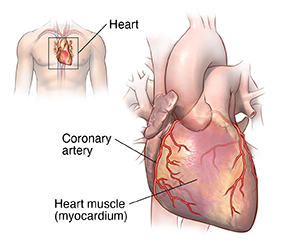Stable Angina
The chest discomfort you have appears to be coming from your heart—a condition called angina. Angina is a pain in the heart due to poor blood flow to the heart muscle. This can occur when plaque builds up on the artery wall or a blood clot forms in one or more of the small blood vessels that deliver oxygen to the heart muscle. Plaque is a fatty material made up of cholesterol, calcium deposits, and other materials.
Exercise, increased activity, emotional upset, or stress can trigger this pain. It can also occur in cold weather or in the morning when you are about to start your day. With proper treatment and lifestyle changes to reduce risk factors, most people with angina are able to have a full and active life.
Angina is not a heart attack. But if angina pain is severe or prolonged, it's a sign of an impending heart attack, also called acute myocardial infarction, or AMI. Your angina is under control at this time. So it's safe for you to go home. Follow up as instructed by your health care provider for any further tests and office visits.

Home care
-
Rest at home today and don't do any emotional or physically strenuous activity.
-
Take medicine (usually nitroglycerin) for chest pain exactly as prescribed. Keep your nitroglycerin with you at all times.
-
When taking nitroglycerin for angina, sit or lie down. The medicine may make you feel dizzy.
-
Place 1 tablet under your tongue, or between your lip and gum, or between your cheek and gum. Let the tablet dissolve completely; don't chew or swallow the tablet.
-
If you use a spray, then spray once on or under your tongue. Don't inhale. Right after you use the spray, close your mouth. Wait a few seconds before you swallow.
-
After taking 1 tablet or spraying once, continue sitting or lying for 5 minutes.
-
If the angina goes away completely, rest awhile and continue your normal routine.
-
If angina persists, you may take 1 or 2 more doses if that was advised by your health care provider. Don't take more than 3 doses within a 15-minute period.
Note: Your provider may give you slightly different instructions than those above. If so, follow them carefully.
Prevention
-
Learn how to take your own blood pressure. Keep a record of your results. Ask your health care provider which readings mean that you need medical attention. Reduce salt intake and follow lifestyle change instructions if you have high blood pressure (hypertension).
-
Maintain a healthy weight. Get help to lose any extra pounds. Talk to your provider about a safe diet program. Sudden large weight losses can be dangerous.
-
If you have diabetes, talk to your provider about healthy control of your blood sugar.
-
Begin an exercise program. Ask your provider how to get started. You can benefit from simple activities such as walking or gardening and can gradually increase your exercise levels. Enrolling in cardiac rehabilitation is a good way to start an exercise program.
-
Break the smoking habit. Enroll in a stop-smoking program to improve your chances of success.
-
Get adequate rest.
-
Stay away from stressful situations. Learn stress-management techniques.
Follow-up care
Follow up with your health care provider, or as advised.
Call 911
This is the fastest and safest way to get to the nearest emergency department. The paramedics can also start treatment on the way to the hospital, saving valuable time for your heart.
-
If angina gets worse, continues, occurs at rest, or if it stops and returns, call 911 right away. Don't delay. You may be having a heart attack.
Don't wait until your symptoms are severe to call 911. Other reasons to call 911 besides chest pain include:
-
Trouble breathing.
-
Feeling lightheaded, faint, or dizzy.
-
Rapid heartbeat.
-
Slower than usual heart rate compared to your normal heart rate.
-
Angina with weakness, dizziness, fainting, heavy sweating, nausea, or vomiting.
-
Extreme drowsiness, or confusion.
-
Weakness of an arm or leg or on one side of the face.
-
Trouble with speech or vision.
When to get medical advice
Remember, the signs and symptoms of a heart attack are not always like they are on TV. Sometimes they aren't so obvious. You may only feel weak or just "not right." If it's not clear or if you have any doubt, call for advice. Or call 911 to proceed to an emergency department.
-
Get help if there's a change in the type of pain, or it feels different, or it starts happening at rest.
-
Don't drive yourself. Have someone else drive, preferably by calling 911 to get an ambulance.
-
If your health care provider has given you medicine to take when you have symptoms, take it. But don't delay getting help.
-
Don't delay. Fast diagnosis and treatment can prevent or limit the amount of heart damage during a heart attack or stroke.
-
Don't go to your provider's office or a clinic. They may not be able to provide all the testing and treatment you need.